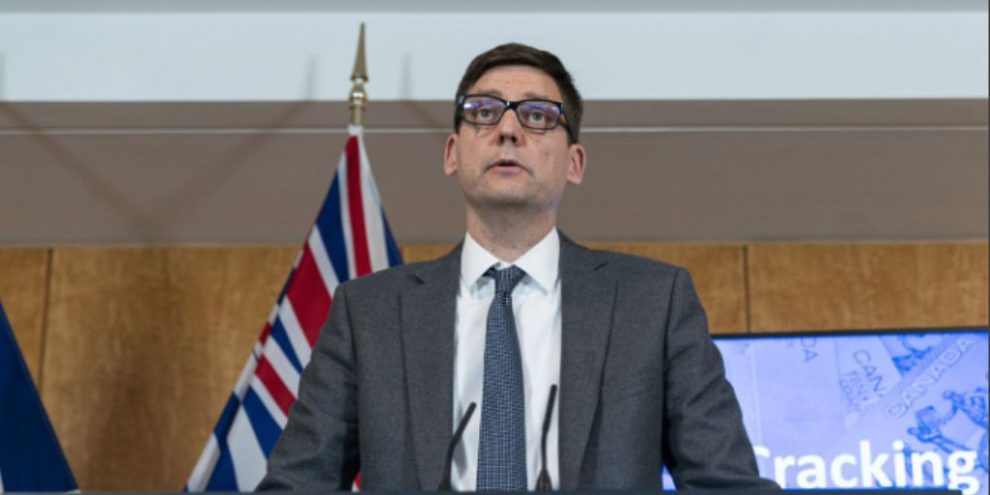
By Brieanna Charlebois in Vancouver
A proposed $150-million settlement with Purdue Pharma Canada covering all provinces and territories has been reached for the recovery of health-care costs related to the sale and marketing of opioid-based pain medication.
British Columbia Attorney General David Eby said Wednesday that it’s the largest settlement of a governmental health-care cost claim in Canadian history.
The province launched a proposed class-action lawsuit in 2018 against more than 40 drug companies on behalf of all federal, provincial and territorial governments with the aim of recovering health-care costs for the "wrongful conduct of opioid manufacturers, distributors and their consultants."
Eby said the proposed settlement was accepted by governments across Canada and a plan is being worked on to determine how the money will be divided, based on the impact on each province.
"The money will be going to supporting provincial programs to fight the opioid epidemic that we believe Purdue's actions contributed to through their deceptive marketing," he said.
Over 27,000 people died across the country from toxic street drugs between 2016 and September 2021.
"We took this action to recover health-care costs and to hold opioid companies to account for their part in allegedly engaging in deceptive marketing tactics to increase sales, which led to increased rates of addiction and overdose," Eby told a news conference.
He said the B.C. government is "committed to aggressively pursuing litigation against the other manufacturers and distributors that put profits before people."
The cost of the opioid epidemic on provincial health-care systems is "likely in the billions of dollars," Eby said.
"In the United States, the claims amount to trillions of dollars, and have resulted in the bankruptcy of Purdue's arm in the United States."
He said Canada faced the possibility of being grouped into a number of unsecured creditor claims within the U.S. bankruptcy proceeding, where the amount available to the entire group is just $15 million.
The B.C. sanctions allowed Canadian jurisdictions to prevent Purdue from liquidating their Canadian operations to pay American claims, which would have left Canada with nothing after U.S. bankruptcy proceedings, he said.
"So in that respect, this is a remarkable accomplishment for British Columbia and all the provinces in Canada to ensure that Canadians see some proceeds from Purdue's actions in deceptively marketing."
In the United States, more than 3,000 lawsuits have been filed by governments, unions, hospitals and other entities in an effort to make drug companies, pharmacies and distributors accountable for their role in the opioid crisis.
American businesses, mostly those that sold or made the drugs, have already faced settlements, judgments and civil and criminal penalties totalling more than $47 billion.
British Columbia's Mental Health and Addictions Minister, Sheila Malcolmson, called the settlement "an important step forward" in the effort to end the province's toxic drug emergency.
"We know the settlement will not make up for the lives lost, the terrible loss of loved ones in our communities, so our government remains steadfast in its commitment to end the public health emergency," she said.
Eby said there are many manufacturers, distributors and their consultants that remain named in the litigation.
"And they are on notice by this settlement that we will be pursuing them aggressively."
Health Canada said the federal government is exploring "all appropriate options to hold companies accountable for (their) role in the overdose crisis if they acted inappropriately in the marketing and distribution of opioids."
To limit the marketing of opioids directed at health professionals, all opioid advertising material must be vetted by an advertising preclearance agency before it can be used.
"As of June 2019, all promotional materials are required to follow exactly what is in the product monograph. Health Canada is also identifying non-compliant marketing practices and rigorously enforcing the laws as they exist today," Health Canada said in a written statement.
British Columbia's application for certification of its class-action lawsuit has been scheduled to be heard in B.C. Supreme Court in the fall of 2023.
The province said certification could open the door to further settlements to recover health-care costs.
This report by The Canadian Press was first published June 29, 2022.
Feature image - British Columbia's Attorney General David Eby speaks to reporters in Vancouver on June 15, 2022. THE CANADIAN PRESS/Rich Lam.






